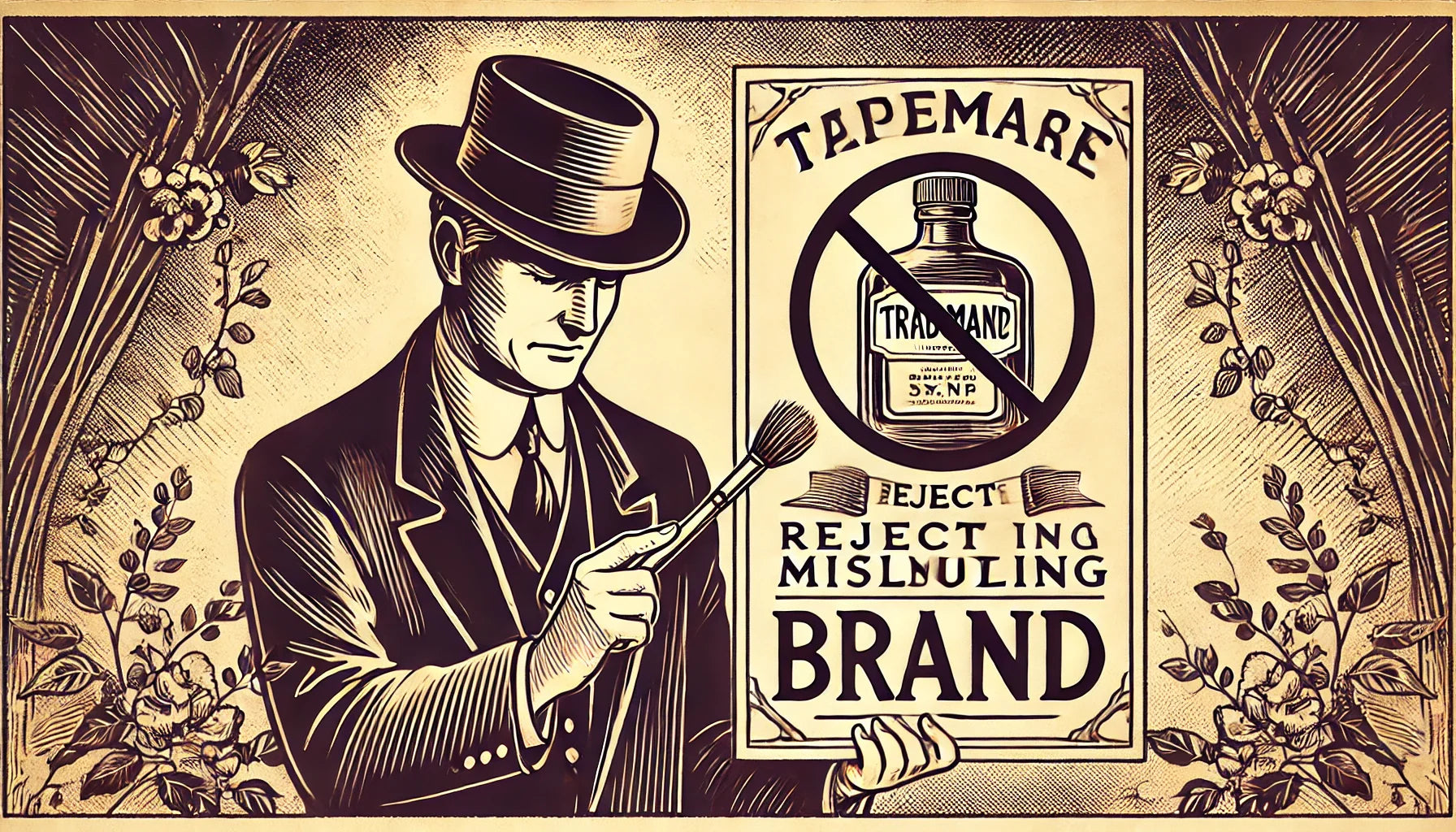Quick Summary
Deceptive trademarks may seem clever, but they can get you sued, fined, or wreck your brand's reputation. Learn why misleading branding isn't just risky—it's potentially illegal.
Common Questions & Answers
Q1: What exactly is a deceptive trademark?
A trademark that gives consumers a false impression about a product's nature, quality, or origin.
Q2: Can a deceptive trademark be registered?
Rarely. The USPTO typically refuses trademarks that are deemed deceptive.
Q3: How do I know if my trademark is misleading?
If your brand name suggests qualities your product doesn't have, you might have a problem.
Q4: What happens if I use a deceptive trademark anyway?
You could face lawsuits, fines, cancellation of the trademark, and major public backlash.
Q5: Can I fix a deceptive trademark issue?
Yes, but it often requires a rebrand and legal intervention—aka, expensive!
![]()
Step-by-Step Guide
1. Audit Your Brand Name:
Compare your trademark claims with your actual product qualities.
2. Conduct a Legal Review:
Work with an IP attorney to assess risk before launch.
3. Perform a Consumer Survey:
See if your branding causes misunderstandings among typical buyers.
4. Correct Course Early:
If there's potential confusion, adjust the trademark before scaling.
5. Monitor Competitors:
Stay alert to deceptive practices around you—they could affect your market.
Historical Context
Deceptive trademarks aren't new. The Lanham Act of 1946 laid the groundwork for modern trademark law, prohibiting misleading branding to protect consumers and honest businesses. Before that, common law offered limited protection, allowing "snake oil" salesmen to thrive on exaggerated claims. Fast forward to the late 20th century, and consumer advocacy groups pushed for even stricter rules. Today, both the USPTO and the FTC keep a sharp eye on misleading trademarks, and courts have little sympathy for brands that "accidentally" deceive customers.
Business Competition Examples
1. "Alpine Air" Dehydrated Food:
This brand faced scrutiny when consumers discovered it had no connection to fresh alpine environments.
2. "OrganicGlow" Cosmetics:
Sued after it was found only 10% of their ingredients were organic—a big no-no.
3. "Swiss Chocolate Delight":
A U.S.-made candy using "Swiss" in the name led to a massive trademark challenge.
4. "GreenPlanet Fuel":
Billed as eco-friendly but sourced from fossil fuels, it lost major contracts after exposure.

Discussion Section
Deceptive trademarks blur the line between creative marketing and outright fraud. On one hand, catchy branding is essential to compete in crowded markets. On the other, misleading names damage consumer trust and open the door to lawsuits and regulatory action. Businesses often walk a tightrope: promising excellence while not misrepresenting their products. The ethical considerations run deep—if your brand relies on consumer misunderstanding to succeed, is it really succeeding? Worse yet, brand reputation, once damaged, is nearly impossible to fully recover. Companies need to invest in honest storytelling. It's not just the right thing—it's smart business.

The Debate
Pro-Deceptive Names ("Creative License"):
Some argue branding is about aspiration, not reality. A little exaggeration is part of marketing's DNA.
Anti-Deceptive Names ("Consumer Protection"):
Critics say misleading trademarks exploit trust and destroy market fairness, demanding strict penalties.
Key Takeaways
-
Deceptive trademarks can destroy trust and invite lawsuits.
-
The USPTO often rejects misleading trademark applications.
-
Honest branding = stronger long-term success.
-
Legal reviews before launch can save massive headaches.
-
Consumer surveys are a smart reality check.

Potential Business Hazards
-
Trademark application rejection.
-
Class-action lawsuits from deceived consumers.
-
FTC investigations and penalties.
-
Long-term brand reputation damage.
Myths & Misconceptions
-
Myth: "Small brands won't get caught." (Reality: Regulators target everyone.)
-
Myth: "Trademark registration = legal immunity." (Reality: Registration doesn't excuse deception.)
-
Myth: "Creative names are always fine." (Reality: Creativity can't cross into dishonesty.)
-
Myth: "Consumers don't care." (Reality: They do, and they talk—especially online.)
-
Myth: "We can fix it later." (Reality: Legal fixes are expensive and public backlash can be brutal.)

Book & Podcast Recommendations
-
"Building A StoryBrand" by Donald Miller - https://buildingastorybrand.com
-
"The Art of Invisibility" by Kevin Mitnick (great on consumer skepticism) - https://www.amazon.com/Art-Invisibility-Kevin-Mitnick/dp/0316380504
-
"Trademark Law" Podcast by World Trademark Review - https://www.worldtrademarkreview.com
-
"Under the Influence" Podcast (Marketing lessons) - https://apostrophenetwork.ca/podcasts/under-the-influence/

Legal Cases
-
Bose Corp. v. Consumers Union (1984)
https://supreme.justia.com/cases/federal/us/466/485/ — Key case on product representation accuracy. -
In re Budge Mfg. Co. (1984)
https://casetext.com/case/in-re-budge-mfg-co-inc — "Luv Bandit" car seat covers deceived consumers. -
In re Spirits Int'l, N.V. (2010)
https://casetext.com/case/in-re-spirits-intl-nv — Vodka brand falsely implied Russian origin. -
Federal Trade Commission v. Wellness Support Network, Inc. (2014)
https://www.ftc.gov/news-events/news/press-releases/2014/09/marketers-diabetes-treatment-pay-27-million-settle-ftc-charges — Deceptive health product claims.
Expert Invitation
Want real strategies to bulletproof your brand name from disaster? Book a free consultation at Inventive Unicorn today! Let's make sure your next big idea doesn't come with a big fat lawsuit.

Wrap-Up Conclusion
Bottom line: If you fool your customers, the law might fool you right back—into fines, lawsuits, and PR nightmares. Stick to honesty, and your brand will thank you for it!













